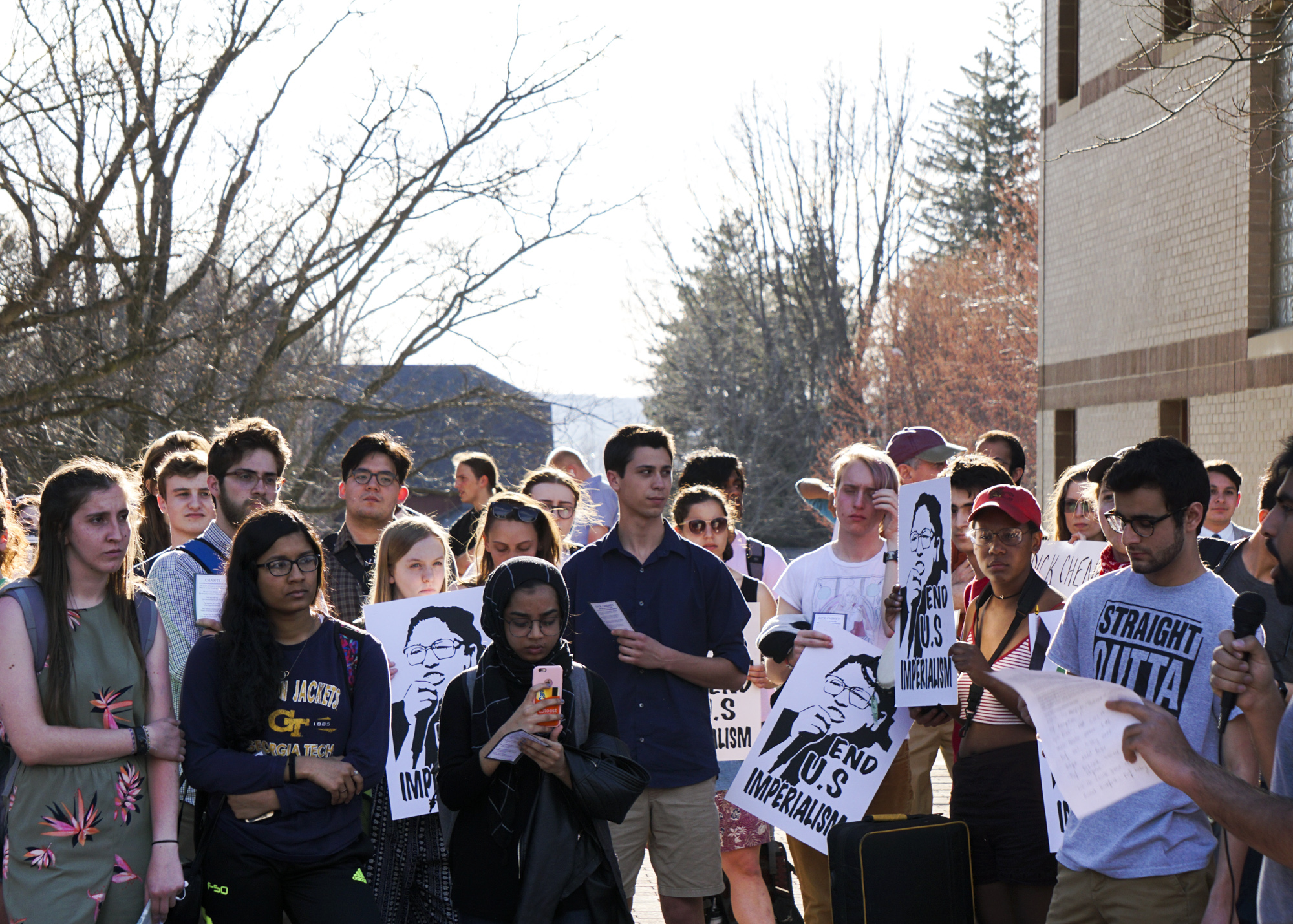“Occupation is a crime, from Iraq to Palestine!” chanted students and faculty outside of Kennedy Hall on Tuesday during a protest against Dick Cheney and U.S. imperialist activity as the former vice president gave a speech hosted by the Cornell Republicans.
Student organizers distributed quarter cards at the protest listing chants and reasons behind the demonstration, stating that “Cheney’s presence here today is a reminder that the U.S. is currently at war in seven countries.”
The protest, planned by nine organizations, among them Cornell Welcomes Refugees, Amnesty International at Cornell and Islamic Alliance for Justice, featured student speakers and Prof. Russell Rickford, history, Prof. Matthew A. Evangelista, government, Prof. Joe Margulies, law and government, Prof. Rachel Weil, history and Prof. Sandra Babcock, law.
“Dick Cheney represents the worst that humanity has to offer,” said Omar Din ’19, secretary of Islamic Alliance for Justice. “Dick Cheney is a figure of death and destruction, who has destroyed families, livelihoods, countries and governments.”
Protesters and speakers criticized the Cornell Republicans for offering Cheney a platform to speak because “war criminals do not deserve a platform,” Marco Antonio Peralta-Ochoa ’21, freshmen representative-at-large for the Student Assembly, said.
Some, like Rickford, interpreted the invitation as an act of complacency.
“The College Republicans knew exactly what they were doing bringing this war criminal to our doorstep as we mark the 15th anniversary of the American invasion of Iraq,” Rickford said, calling the visit “especially perverse” given that May 1 is International Workers’ Day — “a time to celebrate the dignity of the labor classes and the struggle for a society in which the many do not have to toil incessantly for the benefit of the few.”
Lecture organizers’ decision to invite Cheney to campus on such a day, according to Rickford, was a display of “their contempt for humanity,” viewing them as part of a population of American “amnesiacs” who fail to recognize “the crimes of Cheney and the other demons who led us into the inferno of endless war.”
Weil echoed Rickford’s sentiments and clarified that though she does not intend to debate the group’s right to invite Cheney, she does hope that the campus realizes that Cornell Republicans “chose to do so.”
“They had a choice,” she said. “And so we have a right to hold them accountable for that choice.”
Prior to the event, Weil explained that she heard many individuals justify wanting to attend to learn more about an influential figure in American history. However, if the intent of the lecture was indeed to spur campus dialogue and encourage communication between Republicans and Democrats, Weil said, other approaches could have been used to encourage debate, such as studying Cheney extensively by reading documents or watching his interviews.
“Study him just like you would study any other subject like slime-molds or mass killers,” Weil said. “But you don’t invite slime-molds or mass killers to speak at your university … because this gives them legitimacy and authority that slime-molds don’t have.”
The Cornell Republicans strived to offer the campus “a conservative political perspective that they typically wouldn’t hear on campus,” said Michael Johns ’20, current Cornell Republicans treasurer and incoming president. In regard to the protest, Johns said that C.R. did not object to a protest outside the venue “as long as protesters do not violate the right of individuals to attend the event or the right of the speaker to be heard.”
While several protestors focused on the decision taken to bring Cheney on campus, Rickford’s critique of the event expanded beyond the Cornell Republicans and focused on the “hypocrites we are” as Americans.
“We are so damn worried about Cheney’s rights,” he said. “What about the rights of the 150,000 children he annihilated in Iraq? What about the one million poor civilians? Who will speak for them?”
“The lecture is a testament to a culture of ‘free speech absolutism’ that ultimately never saved a single victim of empire,” Rickford said. “We pontificate and deliberate yet in the end we defend no one but the powerful. How foolish we are to believe that we are not directly implicated in America’s assault on humanity.”
Rickford emphasized that at Cornell, students and faculty are “too polished” to speak out against human rights violations, and explained that regardless of how many panels or lectures the University organizes to explore social justice, community members rarely dissent.
All speakers nevertheless praised the student-led protest for furthering campus dialogue. According to Din, student organizers — particularly Muslim students — felt “appalled” by the news of Cheney’s visit to Cornell given his support of military interventions that have impacted the Arab world.
One protest sign spelled out “WAR CRIMINAL” using tickets from the March 21st lecture — when Cheney was originally scheduled to speak.
Prior to the event and throughout the protest, Peralta-Ochoa held a sign that advertised free tickets. Whenever an interested individual asked for one, Peralta-Ochoa responded with “Dick Cheney killed half a million people,” and handed them a ticket with the message “500,000 killed” and “1.7 million displaced” written on it with a marker.
“We’re not hoarding tickets, we don’t impede anybody’s free speech,” Peralta-Ochoa said.









